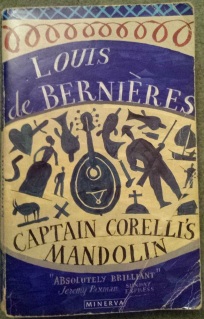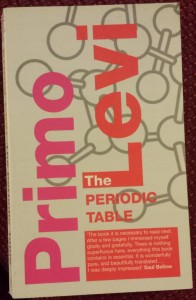 By the time I post this blog article, I will have posed the raw notes I took as I read the book. I am really enjoying making these notes. Creating them adds depth to the experience of reading and I find it worth taking the time as I read. When I was looking up some of the detail after finishing the book I also found bookdrum.com that provides background information about Captain Corelli’s Mandolin and couple of hundred others that warrant special attention. This is similar to my list, but, like, actually good… Great stuff!
By the time I post this blog article, I will have posed the raw notes I took as I read the book. I am really enjoying making these notes. Creating them adds depth to the experience of reading and I find it worth taking the time as I read. When I was looking up some of the detail after finishing the book I also found bookdrum.com that provides background information about Captain Corelli’s Mandolin and couple of hundred others that warrant special attention. This is similar to my list, but, like, actually good… Great stuff!
I wasn’t sure what I was going to make of Captain Corelli’s Mandolin when I started reading it. I had been told by lots of people that it was really good, and I watched the film when it came out, which was long enough ago that I have forgotten everything except that; it’s set in Cephalonia, is about WW2 and has Nick Cage in it. I was disappointed to find that Nick Cage is not in the book Only Kidding 🙂 I guess my illogical trepidation is the reason that I have not read the book, and so many others in my collection. Was it worth committing the time to read it??
YES!
I found the start of the book quite tough going, not in content, but in the way that the text is written. The whole book uses a lot of long, obscure words and I found that were a few too many of them getting in the way of a simple introduction. In general the book is very well written. I would be contradicting a huge number of previous reviews if I were to suggest otherwise. It did however take me a good few pages to decide that I was, actually, enjoying it. Later in the book it is revealed that Greeks like to use the longest words they know whenever possible. I wonder if that is why the book starts the way it does? The story does start with Dr.Iannis who particularly enjoys his words. If not that then it could be the over-enthusiastic “good start” that an author can sometimes produce, or more realistically, just me adjusting to a competent writing style? (I’m currently re-adjusting as I read The Fog, but more on that later…)
As you settle into the book the vocabulary used and the way that different languages are portrayed really draws you in. There are lots of foreign phrases wound into the dialogue and as someone who knows some French, a tiny bit of German and the basics of a couple more languages, it left me understanding enough to give me a wonderfully immersed experience while also invoking that feeling of separation that you experience when you overhear an unfamiliar language spoken. The book takes this still further via a very clever use of accent to portray a person’s mastery of a different language. This is use a few times in the book to great effect, no more so than the British agent (Bunny Warren!) who learnt some Greek at school. His dialogue is written in English, but ye olde English to indicate the difference between the ancient Greek that he learnt and the modern Greek that everyone actually speaks. As the novel progresses and Bunny learns from the locals, his dialogue becomes more and more normal. I have read other books that use accents and Phonetic speech very well, but Captain Corelli’s Mandolin manages to tell a very multilingual tale competently without ever feeling disjointed.
The whole book winds many arcs of story together, and manages to produce and well balanced progression through each that allows evil people to coexist with funny events, to tell a story of actions while allowing the story of someone’s life to grow as it would if you actually knew them. When I think of the emotional attachment I built up for Pelagia I am surprised that I identified with her as a young woman, as effectively a widow, and even as an old lady. I had been on her journey and I knew the depth of her emotions.
There are many ends to the book. The main story ends with the end of the war, but then each story line is ended and the book continues to march on into the lives of Pelagia’s daughter. I initially had a feeling of foreboding that the book might continue on past what could have been a powerful poignant ending. I have to say that my concerns were completely unfounded. In complete defiance of the risks, the book manages to deliver multiple strong endings that fall into line with each other perfectly. The actual finale of the book is relatively quite and understated, but the power of the book really hits home. There is so much story, so many emotions that have gradually built, that although the end is delicately stated the weight of emotion pulls no punches.
So in conclusion, I was going to give this book an 8/10. I appear to be settling on that as the standard rating for books I read for this blog. I suppose that means that so far my hunch was correct. Books I own are easily as good as ones I could be buying. I am very glad that I read Captain Corelli‘s Mandolin. I have proved with the review written that this book deserves more than an 8/10. It surprised me, and definitely in a good way.
Rating 9/10
Captain Corelli’s Mandolin on Good Reads

